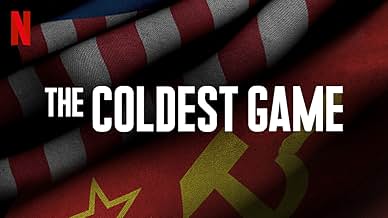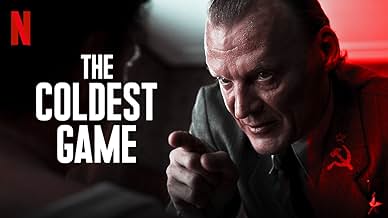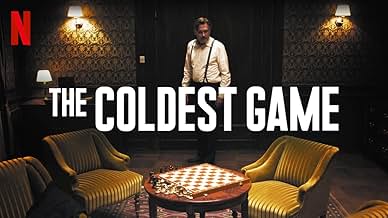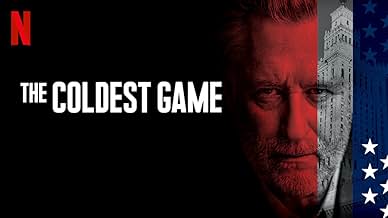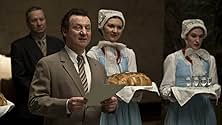CALIFICACIÓN DE IMDb
6.2/10
13 k
TU CALIFICACIÓN
Durante la crisis de los misiles cubanos en 1962, un genio matemático es reclutado para jugar en una partida de ajedrez soviético y estadounidense.Durante la crisis de los misiles cubanos en 1962, un genio matemático es reclutado para jugar en una partida de ajedrez soviético y estadounidense.Durante la crisis de los misiles cubanos en 1962, un genio matemático es reclutado para jugar en una partida de ajedrez soviético y estadounidense.
- Dirección
- Guionistas
- Elenco
- Premios
- 3 premios ganados y 13 nominaciones en total
- Dirección
- Guionistas
- Todo el elenco y el equipo
- Producción, taquilla y más en IMDbPro
Opiniones destacadas
This is my first user review and I really feel like this movie deserves more than the current 6.3 score. Most of the negative reviews dig into the hows and why's of the Cold War, but has nothing to do with this movie. Okay, it's fictional and probably won't fit how things really went back in those days but there is so much good to say about this movie.
First of all: the acting performances are really great. Every personage fits well and keeps the story alive. Dohn Norwood is once again great. His mimics, gestures,... really blend in.
The atmosphere also gets really good. Dark, cold,.. it really sucks you in and make your experience the tensions of that moment in the Cold War.
This movie really surprised me and is well worth your time.
First of all: the acting performances are really great. Every personage fits well and keeps the story alive. Dohn Norwood is once again great. His mimics, gestures,... really blend in.
The atmosphere also gets really good. Dark, cold,.. it really sucks you in and make your experience the tensions of that moment in the Cold War.
This movie really surprised me and is well worth your time.
As far as Netflix-produced movies go, this is one of the best I saw. At least, it has a script that actually makes some sense, albeit in a formulaic way. After all, this is the Cold War and we've pretty much seen everything about that period in time and movie rules (and history) dictate that the Russians are the villains and nobody is to be trusted.
In this movie, the story takes place mostly in Warsaw, which makes a nice change of place from the usual Berlin. A chess championship is taking place during the Cuban missiles crises and a drunkard American professor (Bill Pullman) must act as the go-between spy, besides being the chess champion defying Russia.
Pullman looks a lot like Dennis Hopper and does a good job as the brilliant, unstable genius. His handlers are three suspicious characters, one of whom must be a mole.
My favourite scene takes places in the men's lavatory and it is edited in such a way as to make you wonder what is going on. The previous scene established a character who may also not be what he looks like and the whole plot is directly linked to the opening scene.
Quite enjoyable and suitably gritty, even if I usually don't enjoy movies where the main character is an addict.
In this movie, the story takes place mostly in Warsaw, which makes a nice change of place from the usual Berlin. A chess championship is taking place during the Cuban missiles crises and a drunkard American professor (Bill Pullman) must act as the go-between spy, besides being the chess champion defying Russia.
Pullman looks a lot like Dennis Hopper and does a good job as the brilliant, unstable genius. His handlers are three suspicious characters, one of whom must be a mole.
My favourite scene takes places in the men's lavatory and it is edited in such a way as to make you wonder what is going on. The previous scene established a character who may also not be what he looks like and the whole plot is directly linked to the opening scene.
Quite enjoyable and suitably gritty, even if I usually don't enjoy movies where the main character is an addict.
This is a spy thriller set during the Cuban missile crisis, and centred around a fictional chess match between the Soviet and US chess champions in Warsaw. The US player is indisposed at the last minute, and the Americans substitute the last US player to beat him in a game, a college maths professor with a drink problem, played by Bill Pullman, who no longer plays chess. It transpires that the CIA have an interest in the match, with a clandestine meeting set up. But who can be trusted?
Bill Pullman is a good actor and does his best with the material, but the plot is pretty thin, the kind of thing you might see in a single episode of a TV series. There are also some irritating errors. One CIA person says that they know Russians have sent ships to Cuba but were "too small" to carry nuclear warheads. This is ludicrous, as. a nuclear warhead measures maybe three feet by one, and weighs about 100 kg. It would fit in a canoe, never mind a cargo ship.
On the chess front, I am probably being picky as I play chess quite a bit, but there are also several annoying aspects. The person who oversees the game is an "arbiter", not a "judge", and players do not pass draw offers via the arbiter, they just ask the other player. I understand that for film reasons the players are playing their moves unnaturally fast, but near the start the Pullman character says that the opening will "come down to the Italian game or the Rousseau defence" after the Russian's first move is revealed. This is absurd, as the Italian game is somewhat rare at grandmaster level, and the Rousseau opening is extremely obscure and would never be played at really top level. As for someone who hasn't played chess for a couple of decades beating the top Soviet player, that SI extremely implausible. Even Garry Kasparov, former world champion and arguably the best player of all time, struggled to perform in a tournament when he made a brief comeback a decade or so after he retired.
I had more of a practical issue with the main information to be passed at the clandestine meeting, which seemed unlikely to really be the key to the Cuban missile crisis to me but I don't want to reveal a spoiler. The bigger issue is that the film rather plods along, with limited tension. It is watchable, but hard to really recommend.
Bill Pullman is a good actor and does his best with the material, but the plot is pretty thin, the kind of thing you might see in a single episode of a TV series. There are also some irritating errors. One CIA person says that they know Russians have sent ships to Cuba but were "too small" to carry nuclear warheads. This is ludicrous, as. a nuclear warhead measures maybe three feet by one, and weighs about 100 kg. It would fit in a canoe, never mind a cargo ship.
On the chess front, I am probably being picky as I play chess quite a bit, but there are also several annoying aspects. The person who oversees the game is an "arbiter", not a "judge", and players do not pass draw offers via the arbiter, they just ask the other player. I understand that for film reasons the players are playing their moves unnaturally fast, but near the start the Pullman character says that the opening will "come down to the Italian game or the Rousseau defence" after the Russian's first move is revealed. This is absurd, as the Italian game is somewhat rare at grandmaster level, and the Rousseau opening is extremely obscure and would never be played at really top level. As for someone who hasn't played chess for a couple of decades beating the top Soviet player, that SI extremely implausible. Even Garry Kasparov, former world champion and arguably the best player of all time, struggled to perform in a tournament when he made a brief comeback a decade or so after he retired.
I had more of a practical issue with the main information to be passed at the clandestine meeting, which seemed unlikely to really be the key to the Cuban missile crisis to me but I don't want to reveal a spoiler. The bigger issue is that the film rather plods along, with limited tension. It is watchable, but hard to really recommend.
I watched this largely because it was pointed out to me by someone who knows I'm a big chess addict.
Clearly there are a lot of liberties taken here, kind of mixing the 1972 Fischer match with the 1962 Cuban situation, but I believe this artistic license was justified. Just do not go into the movie expecting historical accuracy in the chess sense. Reviewers who gave really bad reviews based on that are entirely missing the point.
A decent watch.
7.5
Clearly there are a lot of liberties taken here, kind of mixing the 1972 Fischer match with the 1962 Cuban situation, but I believe this artistic license was justified. Just do not go into the movie expecting historical accuracy in the chess sense. Reviewers who gave really bad reviews based on that are entirely missing the point.
A decent watch.
7.5
This is a great and original spy thriller that cleverly knits together real historical events: the Cuba crisis, the Cold War and a politically laden chess match between a Russian and an American. But the film could have been much, much better if the writers had incorporated more realistic elements. As for other movies: fewer special effects, and more consultants (or a bit of Wikipedia), please...
To begin with, the narrative of the Cuba Crisis is outdated. The crisis had in fact been triggered by the earlier American deployment of nuclear SM-78 Jupiter missiles in Turkey, right on the border with the Soviet Union. The Soviets simply responded in kind to the aggression. And Kennedy did not 'stare down' Khruschev, saving the Free World. The crisis was resolved when he negotiated a then-secret treaty that included dismantling his Jupiters. Secrecy was important because Kennedy was very concerned with his re-election, and perhaps less so with annihilating the planet...
The chess match did indeed take place, but it was ten years after the crisis. Sadly, the movie gets few chess details right, even if many elements are indeed taken from the chess world. To begin with, top level players are not old men. These days, as in 1972, it is all healthy guys in their twenties. And you don't just come out of retirement for this; top players must constantly follow and study opening theory, and their opponents' repertoires and styles. Also, during such a match, top players have seconds, to help prepare games. Such a match could never have taken place behind the Iron Curtain; the 1972 Fischer-Spassky match was played in Reykjavík, Iceland. The movie also suggests that players move immediately after one another. This never happens, except in time trouble or during (very) obvious exchanges. When a player offers a draw, he may call an arbiter, not a "judge", and these offers are made after one has moved, not before. Players never, ever discuss the position during a game; you refuse a draw offer simply by making a move. There never are/were '15 minute breaks' in chess- the clocks just keep ticking. Games could be adjourned for the next day, where one player would secretely note down his next move in a sealed envelope that was kept by the arbiter. Finally, the chess talk in the movie is mostly nonsense- knights and bishops are equivalent pieces that are exchanged, is never a "sacrifice". Nonexistent gambits and other openings are cited.
What is true is that a world champ (Max Euwe) was a math teacher (not a professor), another had an alcohol problem (Aljechin) and players (Korchnoi, a dissident, playing Karpov) complained being 'hypnotized' by people in the audience. Also, in the famous 1972 match the paranoid and boorish (but brilliant) Bobby Fischer indeed failed to show up for (and forfeited) a game.
Perhaps more importantly, the movie's epilogue highlights the dangers of the nuclear arms race; the US and Russia have indeed recently torn up their treaty on intermediate missiles, following violations by the latter. Also, nuclear powers are obliged to reduce their nuclear arsenals, says the Nuclear Proloferation Treaty that many countries signed, but that is not quite happening while the SALT agreements are expiring ("do as we say, not as we do") making threats against rogue states that also want nuclear power (Iran, N-Korea) sound hollow.
To begin with, the narrative of the Cuba Crisis is outdated. The crisis had in fact been triggered by the earlier American deployment of nuclear SM-78 Jupiter missiles in Turkey, right on the border with the Soviet Union. The Soviets simply responded in kind to the aggression. And Kennedy did not 'stare down' Khruschev, saving the Free World. The crisis was resolved when he negotiated a then-secret treaty that included dismantling his Jupiters. Secrecy was important because Kennedy was very concerned with his re-election, and perhaps less so with annihilating the planet...
The chess match did indeed take place, but it was ten years after the crisis. Sadly, the movie gets few chess details right, even if many elements are indeed taken from the chess world. To begin with, top level players are not old men. These days, as in 1972, it is all healthy guys in their twenties. And you don't just come out of retirement for this; top players must constantly follow and study opening theory, and their opponents' repertoires and styles. Also, during such a match, top players have seconds, to help prepare games. Such a match could never have taken place behind the Iron Curtain; the 1972 Fischer-Spassky match was played in Reykjavík, Iceland. The movie also suggests that players move immediately after one another. This never happens, except in time trouble or during (very) obvious exchanges. When a player offers a draw, he may call an arbiter, not a "judge", and these offers are made after one has moved, not before. Players never, ever discuss the position during a game; you refuse a draw offer simply by making a move. There never are/were '15 minute breaks' in chess- the clocks just keep ticking. Games could be adjourned for the next day, where one player would secretely note down his next move in a sealed envelope that was kept by the arbiter. Finally, the chess talk in the movie is mostly nonsense- knights and bishops are equivalent pieces that are exchanged, is never a "sacrifice". Nonexistent gambits and other openings are cited.
What is true is that a world champ (Max Euwe) was a math teacher (not a professor), another had an alcohol problem (Aljechin) and players (Korchnoi, a dissident, playing Karpov) complained being 'hypnotized' by people in the audience. Also, in the famous 1972 match the paranoid and boorish (but brilliant) Bobby Fischer indeed failed to show up for (and forfeited) a game.
Perhaps more importantly, the movie's epilogue highlights the dangers of the nuclear arms race; the US and Russia have indeed recently torn up their treaty on intermediate missiles, following violations by the latter. Also, nuclear powers are obliged to reduce their nuclear arsenals, says the Nuclear Proloferation Treaty that many countries signed, but that is not quite happening while the SALT agreements are expiring ("do as we say, not as we do") making threats against rogue states that also want nuclear power (Iran, N-Korea) sound hollow.
¿Sabías que…?
- TriviaLead actor William Hurt broke his leg in an off-set accident a few days after filming started. The injury was so bad that he had to be replaced by actor Bill Pullman.
- ErroresThe American flag is displayed improperly on the wall during the chess match. According to US flag etiquette, the blue star field should always be displayed in the upper left hand corner when the flag is hung on a wall.
- Citas
Agent Stone: God protects children, drunks, and the United States, as they say.
- Bandas sonorasZagubiona rozmowa
Music by Milosz Wosko
Performed by Przemyslaw Florczak, Sebastian Frankiewicz, Robert Murakowski, Maciej Szczycinski & Milosz Wosko
Selecciones populares
Inicia sesión para calificar y agrega a la lista de videos para obtener recomendaciones personalizadas
- How long is The Coldest Game?Con tecnología de Alexa
Detalles
- Fecha de lanzamiento
- Países de origen
- Sitio oficial
- Idiomas
- También se conoce como
- Ván Cờ Chiến Tranh Lạnh
- Locaciones de filmación
- Productoras
- Ver más créditos de la compañía en IMDbPro
- Tiempo de ejecución1 hora 42 minutos
- Color
- Mezcla de sonido
- Relación de aspecto
- 2.39 : 1
Contribuir a esta página
Sugiere una edición o agrega el contenido que falta

Principales brechas de datos
What is the Japanese language plot outline for The Coldest Game (2019)?
Responda
![Ver Trailer [OV]](https://m.media-amazon.com/images/M/MV5BNTViYjYyZjYtOTI1NS00NzhhLTg3MDEtZGUxOTM3Mjc2OGU0XkEyXkFqcGdeQXRyYW5zY29kZS13b3JrZmxvdw@@._V1_QL75_UX500_CR0)
